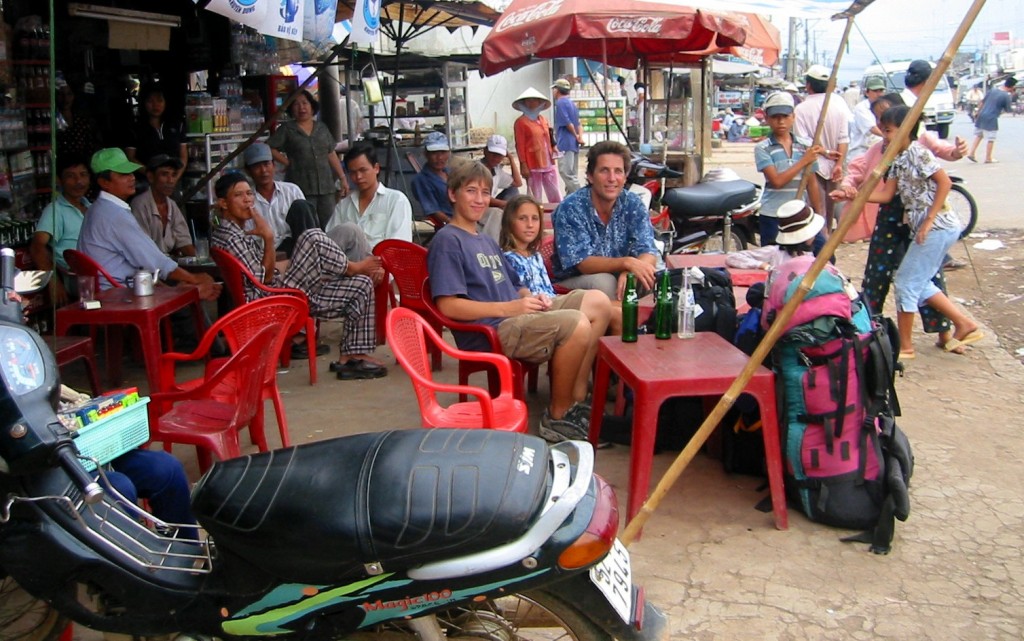RIP: Javan rhino (30 million B.C. – 2011)
I sent the sad link to my kids: “The last Javan rhino in Vietnam has gone.” This stark quote came from the World Wildlife Fund Vietnam country director, Tran Thi Minh Hien, as he announced the permanent loss of another species from the face of the earth.
Normally, the discovery of yet another extinction in this great age of extinctions might not have struck me so hard. But in 2001, I traveled with my then 13-year-old son and 9-year-old daughter to the Annamite Mountains of Vietnam, in search of this famed, lesser one-horned rhinocerous (Rhinoceros sondaicus annamiticus). Vietnam was one stop on what I had dubbed a “before it’s gone tour” – a five-month, around the world journey that became the fodder for my book Monkey Dancing: A Father, Two Kids, and a Journey to the Ends of the Earth. One part of the trip was to show my kids some of the planet’s ecological wonders before development, climate change, and human activities changed them forever.
Sadly, extinction was one of those forever things I worried about.
At that point, there was evidence that this alarmingly endangered animal still existed, in the newly-minted Nam Cat Tien National Park. (Another sub-species of Javan Rhino is still clinging on in Indonesia.) So we took a bus from Ho Chi Minh City, then motorcycle taxis to the park, for a sobering exploration of international species protection that I detailed in a chapter I called, “Johnny Walker Conservation.” Though we donned leech socks and trudged through the jungle, we did not see any rhinos. At that point, there may have been fewer than a half dozen Vietnamese rhinos alive in the world.
The Javan rhino’s story of rapidly declining numbers held familiar themes to other species’ disappearance: habitat loss, human encroachment, poaching. But this subspecies had its own unique challenges. During the Vietnam War (which the Vietnamese call the “American War”), the U.S. bombarded Vietnam with Agent Orange, which defoliated huge tracts of forest that the rhino and other forest animals called home. Not only did 58,000 U.S. soldiers, more than a million Vietnamese soldiers and up to two million Vietnamese civilians die, but much of Vietnam’s wildlife was presumed to have been wiped out. In the post war reconstruction, human population pressures and the desperate need for economic development put strains on any land capable of raising food or creating income. Much of the remaining forest was cut for timber or cleared for cashew plantations.
That’s why the discovery, in the late 1980s, of a remnant population of rare Javan rhinos struck such a nationalist chord in Vietnam. The war was still a stinging wound, but the country was rebuilding. So finding these armor-plated survivors was cause for celebration – and protection. The national park was created, international conservation groups helped set up poaching patrols and scientific monitoring, and the government of Vietnam put some resources into the program as well.
Not enough, apparently. With the species stressed and compressed into more marginal habitat, the pressures of poaching did the rest. Like so many wild animals on the Asian continent, the rhino was prized for the alleged medicinal properties of its body parts. In the kind of wanton violence that humans have perpetrated on animals (and each other, for that matter), rhinos died for their horns, tigers perished for their bones, elephants massacred for their ivory. In the case of the Javan rhino in Vietnam, the entire subspecies simply disappeared.
Forever.
You can see a short, sad movie here
As a metaphysical poet and lover of metaphor, the 17th century English sage John Donne might well have extended his message to include the rhino in this elegy:
No man is an island entire of itself; every man is a piece of the continent, a part of the main; if a clod be washed away by the sea, Europe is the less, as well as if a promontory were, as well as a manor of thy friends or of thine own were; any man’s death diminishes me, because I am involved in mankind.
Maybe we should amend that to “earthkind.” And we are all diminished, because we lost a fellow traveler recently. Rhino, rest in peace.


